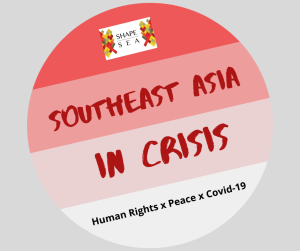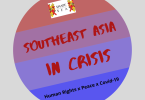Arif R. HaryonoStudent, Asia Pacific MA Human Rights and DemocratisationGlobal Campus of Human Rights Asia PacificInstitute of Human Rights and Peace Studies, Mahidol University
 Socio-economic problems are lurking behind the bushes, as the pandemic not only threatens the public health sector but also endangers the lives of millions of urban poor people in many big cities of Indonesia. They are stranded with no jobs and income and have been forbidden to do any outdoor activities because of the COVID-19.As the number of infected populations rises exponentially, the government neglects to enact assertive policies to contain the spread of the virus. Instead of declaring a territorial quarantine as mandated in Law no. 6 of 2018 on Health Quarantine, the Indonesia government decided to conduct a Large Scale Social Restrictions (PSBB) – a loosened version of a quarantine. The ground concept of PSBB is to obligate the citizens to physically distance themselves in social places without the state responsibility to support the daily needs of the affected population.Moreover, Indonesia is far behind on massive rapid testing, tracking, and tracing of those who make contact with the patients as a means to segregate the infected patients. President Joko Widodo on 19 March calls out the nation to conduct a massive rapid test to detect the infections as soon as possible (Jakarta Globe, 2020), to which on 13 April he repeated the call to ask a 10,000 polymerase chain reaction (PCR) test per day (Gorbiano, 2020). After one month, Indonesia is only able to achieve half of its target (Damarjati, 2020). To overcome pandemic, isolation and medical surveillance are the two most important things that must be implemented. Massive rapid testing is the tool of medical surveillance to determine which population to be confined and which one not.As the strategy of massive rapid testing has not yet achieved the desired target, what is left was physical distancing and social restrictions to the population by campaigning the stay-work-pray at home. Some regions, such as DKI Jakarta and several major cities in West Java and East Java, have enacted the PSBB, and most of the cities have shown a significant decrease in people’s activities in public spaces. However, the method to save the lives of the people has caused economic disruption of the low-rank employees as well as the blue-collar workers who rely upon daily income to make ends meet. Almost most of them lose their income because they cannot carry out any economic activities whatsoever as they normally do. For the economically-affected citizens, no income means no food on the table.The fourth most populated country and member of G-20, Indonesia’s economy is being sustained largely by informal workers. By February 2019, The Badan Pusat Statistik (National Statistics Agency) (2019) stated that more than 74 million Indonesian over 15 years old are working in the informal sectors compared to the formal sectors with only 55,3 million workers. The informal sector is defined by ILO (n.d.) as “all economic activities by workers that are – in law or practice – not covered (or insufficiently covered) by formal employment arrangements.” Bappenas (n.d.) in its report defined informal workers as any form of business ventures with low capital, simple technology, workers from close relatives (family, next of kin), local raw resources, serving the needs of the lower middle class, and low quality of human resources. As these workers are economically hit by the pandemic, it is crucial for the state to provide assistance for them.DKI Jakarta, the epicenter of the pandemic, has managed to deliver weekly assistance to more than 2.2 million households affected by the social restrictions regulations (Nababan, 2020). However, the government’s data often in a daze which causes social assistance is being delivered unequally. Many of the low-middle workers who recently lost their jobs and the informal workers still cannot access this kind of assistance. They are out of the government’s radar for many reasons.It is a problematic condition for the urban poor community during this time of the pandemic. They have to risk their own lives to be infected by COVID-19 by carrying out economic activities to make ends meet. The physical and social restriction policy, which was regulated to protect their life, is also the one that ironically kills them softly and slowly. Many middle-up households in big cities of Indonesia might have the privilege to conduct self-quarantine without many difficulties, for urban poor people the options are limited: cul-de-sac!References:Bappenas, n.d. Studi Profil Pekerja di Sektor Informal dan Arah Kebijakan ke Depan. Bappenas . Available at: <https://www.bappenas.go.id/files/4213/5027/5937/13profil-pekerja-di-sektor-informal-dan-arah-kebijakan-ke-depan__20081123002641__12.pdf> .BPS, 2019. Keadaan Pekerja di Indonesia (Laborer Situation in Indonesia) February 2019. Available at: <https://www.bps.go.id/publication/download.html?nrbvfeve=NGE2YjNiNDRhNjRiMzI1MGMxMGYyZDM2&xzmn=aHR0cHM6Ly93d3cuYnBzLmdvLmlkL3B1YmxpY2F0aW9uLzIwMTkvMDUvMzEvNGE2YjNiNDRhNjRiMzI1MGMxMGYyZDM2L2tlYWRhYW4tcGVrZXJqYS1kaS1pbmRvbmVzaWEtZmVicnVhcmktMjAxOS5odG1s&twoadfnoarfeauf=MjAyMC0wNS0xNSAwMDozNjowNw%3D%3D> .Damarjati, D., 2020. Sebulan Usai Titah Jokowi Target 10 Ribu Tes Corona, Bagaimana Progressnya?. Detik.com . Available at: <https://news.detik.com/berita/d-5013288/sebulan-usia-titah-jokowi-target-10-ribu-tes-corona-bagaimana-progresnya> .Gorbiano, M.I., 2020. COVID-19: Jokowi Calls for At Least 10,000 PCR Tests A Day. The Jakarta Post . Available at: <https://www.thejakartapost.com/news/2020/04/13/covid-19-jokowi-calls-for-at-least-10000-pcr-tests-a-day.html> .ILO, n.d. Informal Economy in Indonesia and Timor-Leste. ILO . Source: <https://www.ilo.org/jakarta/areasofwork/informal-economy/lang–en/index.htm> .Jakarta Globe, 2020. Jokowi Calls for Massive COVID-19 Rapid Testing in Indonesia as Market, Rupiah are Routed. Jakarta Globe . Available at: <https://jakartaglobe.id/news/jokowi-calls-for-massive-covid19-rapid-testing-in-indonesia-as-market-rupiah-are-routed> .Nababan, H.F., 2020. Bansos Tahap di Jakarta Didistribusikan Mulai 14 Mei. Kompas.id . Available at: <https://bebas.kompas.id/baca/metro/2020/05/12/bansos-tahap-2-di-jakarta-didistribusikan-mulai-14-mei/> .
Socio-economic problems are lurking behind the bushes, as the pandemic not only threatens the public health sector but also endangers the lives of millions of urban poor people in many big cities of Indonesia. They are stranded with no jobs and income and have been forbidden to do any outdoor activities because of the COVID-19.As the number of infected populations rises exponentially, the government neglects to enact assertive policies to contain the spread of the virus. Instead of declaring a territorial quarantine as mandated in Law no. 6 of 2018 on Health Quarantine, the Indonesia government decided to conduct a Large Scale Social Restrictions (PSBB) – a loosened version of a quarantine. The ground concept of PSBB is to obligate the citizens to physically distance themselves in social places without the state responsibility to support the daily needs of the affected population.Moreover, Indonesia is far behind on massive rapid testing, tracking, and tracing of those who make contact with the patients as a means to segregate the infected patients. President Joko Widodo on 19 March calls out the nation to conduct a massive rapid test to detect the infections as soon as possible (Jakarta Globe, 2020), to which on 13 April he repeated the call to ask a 10,000 polymerase chain reaction (PCR) test per day (Gorbiano, 2020). After one month, Indonesia is only able to achieve half of its target (Damarjati, 2020). To overcome pandemic, isolation and medical surveillance are the two most important things that must be implemented. Massive rapid testing is the tool of medical surveillance to determine which population to be confined and which one not.As the strategy of massive rapid testing has not yet achieved the desired target, what is left was physical distancing and social restrictions to the population by campaigning the stay-work-pray at home. Some regions, such as DKI Jakarta and several major cities in West Java and East Java, have enacted the PSBB, and most of the cities have shown a significant decrease in people’s activities in public spaces. However, the method to save the lives of the people has caused economic disruption of the low-rank employees as well as the blue-collar workers who rely upon daily income to make ends meet. Almost most of them lose their income because they cannot carry out any economic activities whatsoever as they normally do. For the economically-affected citizens, no income means no food on the table.The fourth most populated country and member of G-20, Indonesia’s economy is being sustained largely by informal workers. By February 2019, The Badan Pusat Statistik (National Statistics Agency) (2019) stated that more than 74 million Indonesian over 15 years old are working in the informal sectors compared to the formal sectors with only 55,3 million workers. The informal sector is defined by ILO (n.d.) as “all economic activities by workers that are – in law or practice – not covered (or insufficiently covered) by formal employment arrangements.” Bappenas (n.d.) in its report defined informal workers as any form of business ventures with low capital, simple technology, workers from close relatives (family, next of kin), local raw resources, serving the needs of the lower middle class, and low quality of human resources. As these workers are economically hit by the pandemic, it is crucial for the state to provide assistance for them.DKI Jakarta, the epicenter of the pandemic, has managed to deliver weekly assistance to more than 2.2 million households affected by the social restrictions regulations (Nababan, 2020). However, the government’s data often in a daze which causes social assistance is being delivered unequally. Many of the low-middle workers who recently lost their jobs and the informal workers still cannot access this kind of assistance. They are out of the government’s radar for many reasons.It is a problematic condition for the urban poor community during this time of the pandemic. They have to risk their own lives to be infected by COVID-19 by carrying out economic activities to make ends meet. The physical and social restriction policy, which was regulated to protect their life, is also the one that ironically kills them softly and slowly. Many middle-up households in big cities of Indonesia might have the privilege to conduct self-quarantine without many difficulties, for urban poor people the options are limited: cul-de-sac!References:Bappenas, n.d. Studi Profil Pekerja di Sektor Informal dan Arah Kebijakan ke Depan. Bappenas . Available at: <https://www.bappenas.go.id/files/4213/5027/5937/13profil-pekerja-di-sektor-informal-dan-arah-kebijakan-ke-depan__20081123002641__12.pdf> .BPS, 2019. Keadaan Pekerja di Indonesia (Laborer Situation in Indonesia) February 2019. Available at: <https://www.bps.go.id/publication/download.html?nrbvfeve=NGE2YjNiNDRhNjRiMzI1MGMxMGYyZDM2&xzmn=aHR0cHM6Ly93d3cuYnBzLmdvLmlkL3B1YmxpY2F0aW9uLzIwMTkvMDUvMzEvNGE2YjNiNDRhNjRiMzI1MGMxMGYyZDM2L2tlYWRhYW4tcGVrZXJqYS1kaS1pbmRvbmVzaWEtZmVicnVhcmktMjAxOS5odG1s&twoadfnoarfeauf=MjAyMC0wNS0xNSAwMDozNjowNw%3D%3D> .Damarjati, D., 2020. Sebulan Usai Titah Jokowi Target 10 Ribu Tes Corona, Bagaimana Progressnya?. Detik.com . Available at: <https://news.detik.com/berita/d-5013288/sebulan-usia-titah-jokowi-target-10-ribu-tes-corona-bagaimana-progresnya> .Gorbiano, M.I., 2020. COVID-19: Jokowi Calls for At Least 10,000 PCR Tests A Day. The Jakarta Post . Available at: <https://www.thejakartapost.com/news/2020/04/13/covid-19-jokowi-calls-for-at-least-10000-pcr-tests-a-day.html> .ILO, n.d. Informal Economy in Indonesia and Timor-Leste. ILO . Source: <https://www.ilo.org/jakarta/areasofwork/informal-economy/lang–en/index.htm> .Jakarta Globe, 2020. Jokowi Calls for Massive COVID-19 Rapid Testing in Indonesia as Market, Rupiah are Routed. Jakarta Globe . Available at: <https://jakartaglobe.id/news/jokowi-calls-for-massive-covid19-rapid-testing-in-indonesia-as-market-rupiah-are-routed> .Nababan, H.F., 2020. Bansos Tahap di Jakarta Didistribusikan Mulai 14 Mei. Kompas.id . Available at: <https://bebas.kompas.id/baca/metro/2020/05/12/bansos-tahap-2-di-jakarta-didistribusikan-mulai-14-mei/> .





